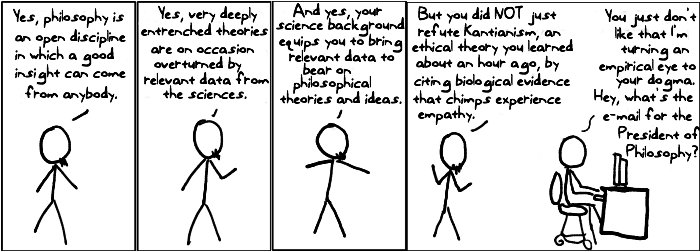Leiter
posts again on women in the profession. Sure, his posts are helpful. And as always we philosophers use our reasoning skills to hash it all out in the comments, so that now we can move toward putting thoughts into action. Ahem.
One thing that's so very nice is that this conversation gets more sophisticated nearly every time we practice it. Sadly, though, the key points remain the same. Which to rehearse this time? That the constant stream of anecdotes about hostility toward women is sufficient to explain quite a lot? That philosophical exceptionalism can't stand up to counterexamples from law, from linguistics, from life sciences? That the success of other disciplines in moving toward gender parity has been the result of a lot of hard work and concerted programs at national, regional, and local levels?
Sure, that last one always deserves a good run and I haven't said much about the APA
in a good long while.
Margaret Atherton says it so well:
Philosophy now stands out as having a peculiarly low percentage of women. What hasn't happened, of course, is any large-scale disciplinary wide effort to change matters. Periodically people notice the low level of women, speculate that women find aggression distasteful, and go about their business. I think if we want to actually alter the situation we have to stop speculating and do something that is specifically directed toward raising the number of women, perhaps by finding out first what steps successful disciplines have taken.
By having taken our sweet time talking rather than acting, we are in the good position of having a lot of practical research literature to draw on. Maybe our discipline hasn't been eligible for all those STEM funds from NSF (we're not so essential to economic growth as computer science and engineering), but we can benefit from the research in those fields nonetheless.
We have some good ideas about what supports women and what doesn't:
1. The most important finding across disciplines has been that offering early support to students who express a desire in a subject and breaking down unnecessarily competitive mores reduces the % of students changing their mind about majoring and supports students who are socially marginal, whether because of gender expectations, class, race, family educational history, or whatever.
2. All-female learning communities don't work so great. In general, interventions that call attention to gender in gender-divisive social situations get mixed results because they can undermine and differentiate as well as support.
3. The presence of role models is supportive but can't be expected to overcome other barriers.
4. Personal relationships with teachers are valuable, for reasons that stem from #1 above. For this reason, some departments write letters to their most promising intro students inviting them to consider a philosophy major.
5. Programs that focus on eliminating social obstacles benefit women without violating norms of fairness.
6. When someone is a problem to their colleagues, they are often a problem for students also. Informal interactions are the source of many of the career-breaking anecdotes that we see on blogs and around.
7. Achieving a threshold (around 30% participation by women) has been important in many disciplines.
8. Articulating clear career goals for majors increases interest in the major. Women in particular have responded well to increased information about careers and about the educational and professional tracks for getting into careers. They are also more often concerned about job security and flexibility than status and salary.
9. There is weak support (i.e., it's there but is still an area of some debate) for the idea that women (in general, on average, for the most part...) are attracted to career tracks where they "make a difference." "Making a difference" means different things to different people: having a hand in social change, so-called 'helping' careers, teaching careers, careers that reward creative expression.
I think these last two are important challenges for us.
My office is (anomalously) in the MicroElectronics Building. As a result, I see a lot of signs referring to "Technology for the 21st century" and announcing talks on "Restructuring Engineering to Build Careers in the 21st Century." I think this is not just banal navel-gazing rhetoric. There is some merit to thinking about what good a career will do for people in changing times.
How have philosophers changed what they do and how they do it for the 21st century? (Here are some hints: experimental philosophy, public philosophy.)
What careers do we prepare students for other than teaching philosophy? I would say there are a lot of careers, and that many of those careers "make a difference."
There's no good reason not to couple discussions of improving the gender ratio in philosophy with improving the profile of philosophy and growing the size of the discipline. Increasing the # of women in philosophy need not mean decreasing the # of men; it could mean growth overall.








